|
|
|
Sort Order |
|
|
|
Items / Page
|
|
|
|
|
|
|
| Srl | Item |
| 1 |
ID:
141983
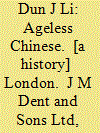

|
|
|
|
|
| Publication |
London, J M Dent and Sons Ltd, 1968.
|
| Description |
xvi, 586p.: ill., mapshbk
|
| Standard Number |
460038125
|
|
|
|
|
|
|
|
|
|
|
|
Copies: C:1/I:0,R:0,Q:0
Circulation
| Accession# | Call# | Current Location | Status | Policy | Location |
| 002309 | 951/DUN 002309 | Main | On Shelf | General | |
|
|
|
|
| 2 |
ID:
108080
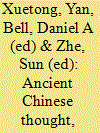

|
|
|
|
|
| Publication |
Princeton, Princeton University Press, 2011.
|
| Description |
viii, 300p.
|
| Standard Number |
9780691148267, hbk
|
|
|
|
|
|
|
|
|
|
|
|
Copies: C:1/I:0,R:0,Q:0
Circulation
| Accession# | Call# | Current Location | Status | Policy | Location |
| 056349 | 327.51/XUE 056349 | Main | On Shelf | General | |
|
|
|
|
| 3 |
ID:
025076
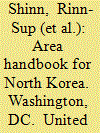

|
|
|
|
|
| Publication |
Washington, DC, U.S.Government Printing Office, 1969.
|
| Description |
xvi, 481p.: ill.hbk
|
|
|
|
|
|
|
|
|
|
|
|
Copies: C:1/I:0,R:0,Q:0
Circulation
| Accession# | Call# | Current Location | Status | Policy | Location |
| 005977 | 951.93032/SHI 005977 | Main | On Shelf | General | |
|
|
|
|
| 4 |
ID:
033779
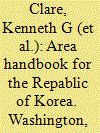

|
|
|
|
|
| Publication |
U S Government Printing Office, 1969.
|
| Description |
xiv, 492p.hbk
|
|
|
|
|
|
|
|
|
|
|
|
Copies: C:1/I:0,R:0,Q:0
Circulation
| Accession# | Call# | Current Location | Status | Policy | Location |
| 006563 | 951.9032/CLA 006563 | Main | On Shelf | General | |
|
|
|
|
| 5 |
ID:
113702
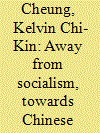

|
|
|
|
|
| Publication |
2012.
|
| Summary/Abstract |
Following the success of China's economic reform in the past few decades, Chinese nationalism has entered a new stage. The sentiment born of 'the century of national humiliation' is insufficient to explain the phenomenon of Chinese new nationalism. In this new era, China no longer regards the West as the benchmark against which it defines its success, but is becoming more assertive about its own values and perspectives. This emphasis on a Chinese perspective is related to the cultural shift in China's post-socialist transition, where the source of legitimacy in China's development has moved from an ideological dimension of socialism to a cultural dimension of 'Chinese characteristics'. Following this transition, growing importance is being placed on an indigenous voice in many aspects of China's development, including the recent efforts to reinvent traditional Chinese culture as a source of China's soft power. In particular, with strong state sponsorship, Confucianism is being revived as a new nationalist discourse, which not only provides new discursive resources for continuing authoritarianism in mainland China, but also redefines governance and nation-building with respect to Hong Kong and Taiwan.
|
|
|
|
|
|
|
|
|
|
|
|
|
|
|
|
| 6 |
ID:
091430
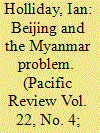

|
|
|
|
|
| Publication |
2009.
|
| Summary/Abstract |
The re-emergence of China as a major economic and political power has drawn attention to the role it might play in solving regional problems. Prominent among many Asian issues on Beijing's agenda is its southwestern neighbour, Myanmar, and in particular the military machine that has long ruled the country with an iron fist. The junta in place today is both acknowledged as problematic by policymakers in Beijing, and seen by the wider world as a regional challenge on which China should take the lead. However, there is little agreement on ways forward. To determine how Beijing might handle the Myanmar problem, this article first examines the concept of intervention, reviewing the manifold modes found in the contemporary world and drawing up a typology. Then it surveys arguments about intervention, focusing on perspectives that are relevant in this context. Next it presents arguments about intervention in Myanmar, and follows up by looking in some detail at China's current low-level engagement. Finally it considers where Beijing might go from here in dealing with Myanmar. The argument pulled together in the conclusion is that while nobody has a full solution to the Myanmar problem, a case for enhancement of China's role can be grounded not only in its global obligations, but also in precepts found deep in its national tradition. It is here that efforts to boost Beijing's engagement should be directed.
|
|
|
|
|
|
|
|
|
|
|
|
|
|
|
|
| 7 |
ID:
113158
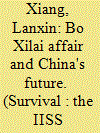

|
|
|
|
|
| Publication |
2012.
|
| Summary/Abstract |
Money, sex, murder, conspiracy: the Bo Xilai affair has all the makings of a political thriller. But there is nothing fictional about the reality show currently unfolding before the eyes of 1.3 billion people in China. The significance of this drama for China's future should not be underestimated. International media coverage ofthe affair has missed a crucial point: scandalous as it may be, Bo's downfall may have opened a window of opportunity for reform-minded Chinese leaders to build consensus for launching serious political reforms. Bo himself is facing accusations of corruption, at least for now, but the real issue goes beyond the need to crack down on corruption among party officials, which is so widespread that the very foundation of the Communist Party's rule is threatened.
|
|
|
|
|
|
|
|
|
|
|
|
|
|
|
|
| 8 |
ID:
085415
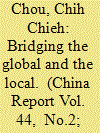

|
|
|
|
|
| Publication |
2008.
|
| Summary/Abstract |
This article aims to explore China's attempt to shift the tension between the global value and local difference over human rights debates. In other words, this article examines the relationship between West-promoted human rights and China-led neo-Confucian values within the context of globalisation rather than examining what Confucian values are. In what ways can a cultural discourse be viewed and employed to promote human rights without denying their universality, is the focal point of this article. This article: (a) reviews why universalist versus relativist is a false dichotomy; (b) introduces the reconstruction of Confucianism since the 1980s in China and examines the possibility of re-appropriating Confucian values; (c) elaborates the necessity of nation-states for resisting the threats of globalisation and for implementing human rights practices; and (d) concludes with Confucian discourse, developed in China, as an exemplary case that universal values and particular differences can be negotiated in a way that respecting cultural differences constitutes a universal value.
|
|
|
|
|
|
|
|
|
|
|
|
|
|
|
|
| 9 |
ID:
029722
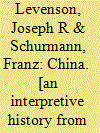

|
|
|
|
|
| Publication |
Berkeley, University of California Press, 1969.
|
| Description |
xi, 141p.hbk
|
|
|
|
|
|
|
|
|
|
|
|
Copies: C:1/I:0,R:0,Q:0
Circulation
| Accession# | Call# | Current Location | Status | Policy | Location |
| 006072 | 951.01/LEV 006072 | Main | On Shelf | General | |
|
|
|
|
| 10 |
ID:
001633
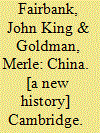

|
|
|
|
|
| Publication |
Cambridge, University Press, 1998.
|
| Description |
xix, 546p.hbk
|
| Standard Number |
0674116720
|
|
|
|
|
|
|
|
|
|
|
|
Copies: C:1/I:0,R:0,Q:0
Circulation
| Accession# | Call# | Current Location | Status | Policy | Location |
| 041213 | 951/FAI 041213 | Main | On Shelf | General | |
|
|
|
|
| 11 |
ID:
118932
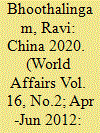

|
|
|
| 12 |
ID:
091610
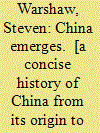

|
|
|
|
|
| Edition |
11th Rev ed.
|
| Publication |
Berkeley, Diablo Press, 1998.
|
| Description |
ix, 252p.pbk
|
| Standard Number |
0872970019
|
|
|
|
|
|
|
|
|
|
|
|
Copies: C:1/I:0,R:0,Q:0
Circulation
| Accession# | Call# | Current Location | Status | Policy | Location |
| 054467 | 951/WAR 054467 | Main | On Shelf | General | |
|
|
|
|
| 13 |
ID:
172311
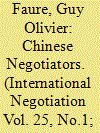

|
|
|
|
|
| Summary/Abstract |
Since China opened to the outside world in 1978, Chinese negotiators have made considerable changes in the ways they consider negotiation, strategies to implement action, and tactics used. The underlying values of their practice have also undergone a notable evolution. However, there are dimensions which remain stable and constitute the core of what could be defined as the deep “Chineseness” of these negotiators. This essay provides insight into Chinese negotiation practice and its evolution.
|
|
|
|
|
|
|
|
|
|
|
|
|
|
|
|
| 14 |
ID:
024684
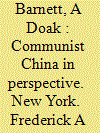

|
|
|
|
|
| Publication |
New York, Frederick A. Praeger Inc., 1962.
|
| Description |
vi, 88p.pbk
|
| Series |
Praeger Publications in Russian History and World Communism
|
|
|
|
|
|
|
|
|
|
|
|
Copies: C:1/I:0,R:0,Q:0
Circulation
| Accession# | Call# | Current Location | Status | Policy | Location |
| 000742 | 951.05/BAR 000742 | Main | On Shelf | General | |
|
|
|
|
| 15 |
ID:
183454
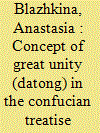

|
|
|
|
|
| Summary/Abstract |
This article analyzes the concept of Great Unity (datong), textually enshrined in the Liyun section of the treatise Kongzi Jiayu. Confucian thinkers consider the concept of Great Unity to be the ideal state in which the Celestial Empire existed in the period of golden antiquity. This concept is of direct relevance to contemporary Chinese political culture. It was embodied in the idea of the "Community of Common Destiny for Mankind" (renlei mingyun gongtongti), proposed by Xi Jinping, General Secretary of the CPC Central Committee, in November 2012, at the 18th CPC Congress. This article reveals the main ideological content of the Liyun section of Kongzi Jiayu and makes a preliminary comparison with the chapter of the same name from the famous written artifact Liji.
|
|
|
|
|
|
|
|
|
|
|
|
|
|
|
|
| 16 |
ID:
117052
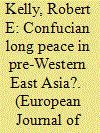

|
|
|
|
|
| Publication |
2012.
|
| Summary/Abstract |
International Relations theory about East Asia has increasingly argued that East Asia before Western penetration enjoyed a protracted peace. As explanations, a Chinese military hegemony would fit realist theory fairly well, while a cultural peace based on shared Confucian norms would be a significant anomaly. A Confucian Long Peace challenges widely held, albeit Eurocentric, realist presumptions including the perils of anarchy, the arms-racing and misperception of the security dilemma, and the regularity of power balancing. This article therefore investigates, first, whether such a peace did in fact exist, and, second, whether this might be attributed to Confucianism. A cultural peace theory requires a strong anti-war cultural norm and a shared sense of community. Skepticism is established by examining three comparative cultural spaces that nonetheless did not enjoy a culturally informed peace: the classical Greek city-state system, early modern Christendom, and the contemporary Arab state system. All were deeply riven and competitive. Nevertheless, empirical investigation of the last Chinese (Qing) dynasty before the Western arrival (1644-1839) demonstrates that it was remarkably peaceful toward its Confucian neighbors, while more 'normally' exploiting its power asymmetry against non-Confucian ones. Process-tracing specialized Chinese practices toward fellow Confucians suggests that the low Confucian war finding emanates from cultural restraint.
|
|
|
|
|
|
|
|
|
|
|
|
|
|
|
|
| 17 |
ID:
092776
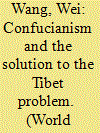

|
|
|
| 18 |
ID:
169553
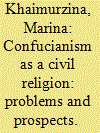

|
|
|
|
|
| Summary/Abstract |
The concept of a civil religion is now gaining importance in Chinese society. Religious traditions (values, symbols, rituals, convictions) join all citizens into a single whole that determines the religious component of everyday life. Founded on Confucian values, civil religion in China can give the Chinese nation a complete commonality of interests, feelings, and thought.
|
|
|
|
|
|
|
|
|
|
|
|
|
|
|
|
| 19 |
ID:
151202
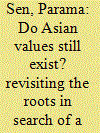

|
|
|
|
|
| Summary/Abstract |
In a world ripped with conflicting issues stemming from varying interests and pressing common concerns, the role of culture and tradition seems to have gained greater salience. At the core of Asia’s cultural assertiveness lies the concept on Asian values. Claimed to be rooted in Confucianism, the discourse appeals to the communitarian Asian tradition pitting it against the individualism of the West. While the use of the concept to explain the economic prosperity of East and Southeast Asia and as a counterforce to globalisation was thwarted by the Asian financial crisis, the belief that Asia and Asians subscribed to a value system fundamentally different from that of the West lingered on. This article seeks to analyse the contemporary relevance of the concept of Asian values and delve into its roots in an attempt to attune it to current realities.
|
|
|
|
|
|
|
|
|
|
|
|
|
|
|
|
| 20 |
ID:
123027
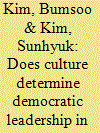

|
|
|
|
|
| Publication |
2013.
|
| Summary/Abstract |
Scholars who believe that democratic leadership varies depending on culture often argue that because of the legacy of Confucian culture, East Asia favors directive leadership. However, based on our case study of South Korea during the Roh Moo-hyun presidency (2003-2008), we argue that democratic leadership varies depending on the political situation, regardless of the society's given cultural traditions. In a society, what we call "appropriate leadership" has more to do with political rather than cultural factors.
|
|
|
|
|
|
|
|
|
|
|
|
|
|
|
|
|
|
|
|
|